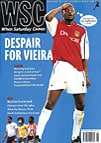 How football has evolved in the modern era
How football has evolved in the modern era
Some would say that the football watching has become a soulless experience, with passive spectators in expensive seats cowed by deafening tannoys. Yet the football fan of the 21st century gets any number of opportunities to recreate the stadium atmosphere of old, standing in a huddle cheering on their team. “Pubs have been dubbed football’s new terraces,” said the Sunday Telegraph, reporting ITV Digital’s plans for next season. These include trying to undercut Sky’s existing deals with the 40,000 pubs which pay an average of £500 per year for the right to show satellite transmissions.
Fans who would prefer to watch their team in the flesh rather than on a widescreen TV are of course fully accustomed to matches being switched to awkward times to suit the broadcasters. But their willingness to travel to a game in preference to following it on screen will be tested as never before next season, when an already bulging televised football schedule will be expanded further with 40 pay per view Premiership matches being broadcast on Sundays.
For the first time, from next season there will be weekends when a majority of matches in the Premiership will be played on days other than a Saturday, with Nationwide League fixtures too spreading through the week at the behest of ITV and its satellite arm. Sky will continue to show other Premiership games on Sundays, together with the Scottish Premiership and the Conference. As was the case with the previous television deal, Sky will have further Premiership games on Monday evenings, sometimes on Tuesdays and Wednesdays too, with European games and FA and Worthington Cup ties also dispersed across the schedules throughout the season.
The fact that football has proven to be such a pot of gold– the creation of the Premiership effectively rescuing the ailing Sky in the early 1990s – dictates the nature of the coverage, increasingly like one long commercial, uncritically selling the product to the viewers. But things could yet become a great deal worse. Already the Sky generation are likely to see football as a product that they consume rather than something to participate in; a development actively sought by the clubs who are not reliant on income from paying spectators.
The time will soon come when these clubs, currently hamstrung by a collectively negotiated TV deal, acquire rights to coverage of their home games. Soon Liverpool are to follow Man Utd in starting their own TV channel, set to launch before the end of the year. In May, they announced the creation of five new channels on their broadband internet service, to show coverage of European games, reserve match highlights and “documentary footage of some of the club’s most famous triumphs”.
All this can be seen not just as a means of making more money but at the same time to exert even greater control over what is said or written about the clubs. This desire to turn reporting into propaganda also extends to the print media and the internet. The Premier League and Football League have proposed a new licensing system for print journalists, which they may see fit to charge for in the future. There is also talk of them charging even for team news on a match day.
When newspapers come to have such a financial relationship with the clubs or the League, it goes without saying that the provider of the information feels they are in the dominant position. Once football needed the papers as much as the papers needed football. Now large football clubs have probably concluded they are no longer getting such a good deal from the printed word. Yet it is in newspapers and magazines, despite the appalling toadying that goes on in some, that you can most easily find criticism of the way football is run. If they are kept in their place, either by charging or by bullying, so much the better for the clubs.
Further avenues for control are opened up by the internet, where so much of football’s news comes from now. When players or clubs can announce their own news through their own sources, their dependence on independent reporters is correspondingly less. And no one is likely to ask awkward questions if news releases are made in cyberspace rather than in front of real reporters.
It is often said that football is a business like any other, but the time may soon come when it is only a business and nothing more.
From WSC 174 August 2001. What was happening this month